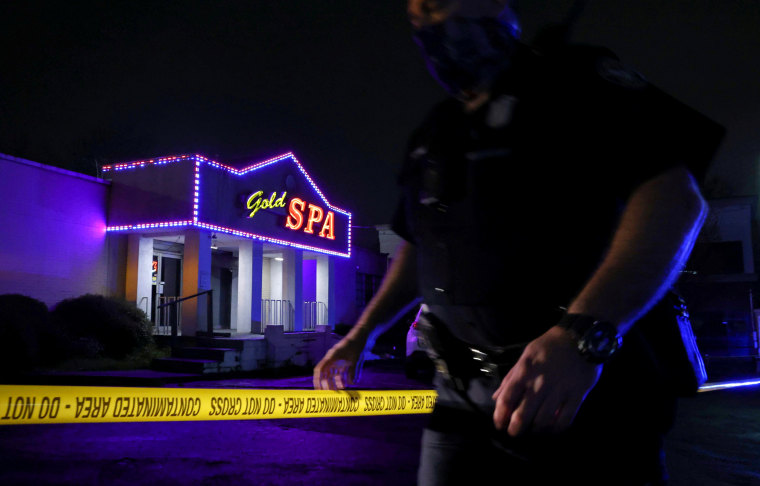During a news conference Wednesday about the arrest of Robert Aaron Long, the man accused of shootings at three spas in the Atlanta area that killed eight people, six of whom were of Asian descent, Cherokee County sheriff's officials said Long had claimed that the killings were not racially motivated. Long has been charged with eight counts of murder and one count of aggravated assault.
Law enforcement should not be advancing a potentially false narrative.
The statement was a serious disservice not only to justice, but also to Asian American Pacific Islander, or AAPI, communities.
First, if the investigation is at such a preliminary stage, as police claim, law enforcement should not be advancing a potentially false narrative. Authorities further said Long had told investigators that he believed the spas provided an outlet for his addiction to sex and were "a temptation he wanted to eliminate."
Further, by announcing what could end up being a false narrative, authorities supported a horrible misconception of sexualized and fetishized Asian women, implying that they have no value. Wednesday's news conference also could taint a future jury pool by prematurely planting the idea in prospective jurors' minds that the killings were not racially motivated and that an alleged sex addiction somehow negates racially motivated animus.
Georgia only recently enacted a hate crimes law, HB 426, which took effect July 1.
Georgia only recently enacted a hate crimes law, HB 426, which took effect July 1. A previous version of the statute was deemed to be "unconstitutionally vague" and struck down in 2004.
When the new version was enacted last year, Georgia was one of only four states that did not have hate crimes laws on the books. The killing of Ahmaud Arbery galvanized support for the passage of HB 426, and now, it might be applied to Long's case.
HB 426 provides new sentencing guidelines for defendants who are convicted of targeting victims based on race, color, religion, national origin, sex, sexual orientation, gender, mental disability or physical disability. If defendants are convicted of a felony or one of five identified misdemeanors (simple assault, simple battery, battery, criminal trespass or misdemeanor theft) and are found to have intentionally targeted the victims based on a protected category, judges can impose additional penalties: up to 12 months in prison and fines up to $5,000 for defendants convicted of "designated misdemeanors." For felony convictions, the increased punishment can be two more years in prison and fines up to $5,000.
Anti-Asian hate crimes rose by more than 150 percent from 2019 to 2020.
In addition, HB 426 requires law enforcement agencies to complete "bias crimes reports" to compile and maintain statistics for all crimes in which victims appear to have been targeted based on one of the protected categories.
In the shootings Tuesday, expressing to the public that the suspect "was fed up" and "had a really bad day" is also not the appropriate way to address the concerns and fears of a community that has been experiencing increased criminal victimization at alarming rates over the past year. Anti-Asian hate crimes rose by more than 150 percent from 2019 to 2020. The reporting forum Stop AAPI Hate said Tuesday that it received more than 3,800 reports of hate incidents in the U.S. from March 2020 to February.
In most criminal cases, especially homicides, authorities are expected to conduct detailed, extensive investigations that include deep dives into suspects' histories, including their social media histories, involvement in organizations and affiliations with certain groups.
It turns out that Long's own family reported him to authorities when they recognized him in surveillance video and photos released to the public. Have investigators interviewed family members to help determine whether the shootings truly were not racially motivated?
In the few hours after his arrest, what did investigators discover about Long and his possible motives? We will eventually learn whether he was telling the truth when he told investigators that the killings were not racially motivated or whether he was just trying to save himself from enhanced punishment under Georgia's hate crimes law.

